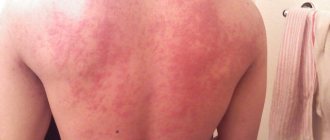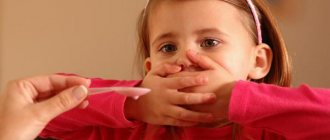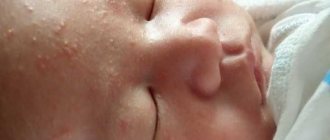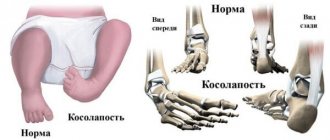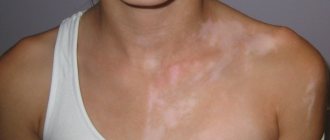Why doesn't the child clear his throat?
When a virus or bacteria enters a child’s body, many cells are activated and begin to fight foreign objects. As a result of this process, dead viruses and bacteria, along with a small number of pathogenic cells, turn into mucus.
Mucus can have a thin or thick consistency. The liquid is easily removed from the child’s respiratory system, but the viscous consistency settles for a long time in the sinuses of the nasopharynx. Thick mucus appears due to the accumulation of a large number of pathogens in the bronchi. Small children are not yet able to fully cough it up.
Infants have a poorly developed cough reflex, and they spend most of their time in an upright position, which significantly aggravates the process of clearing mucus from the respiratory tract.
Which doctor should I contact?
What to do if your child’s cough does not go away for a long time
Even if parents know how to help their child cough up mucus, it is imperative to visit a doctor, especially if the newborn is sick. When a child spends a lot of time in a horizontal position, mucus accumulates; if the baby is stuffy, it also dries out, which leads to complications.
The doctor must constantly monitor the baby and listen to his breathing with a stethoscope. If you have a wet cough, you should contact your pediatrician, who, if necessary, can refer you for an x-ray to rule out pneumonia. After the examination, the doctor will tell you what to do if the child cannot cough up sputum. Drug treatment for infants is prescribed when absolutely necessary; it should only be used under the supervision of a doctor. Usually, medications are used that relieve inflammation of the bronchi and help with the discharge of sputum.
How to help cough up phlegm
In order to alleviate the child’s condition and help him remove viscous mucus from the bronchi, parents need:
- Resort to the help of medicines. Depending on the cause of the cough, the name of the drug used will depend. As a rule, for ARVI and influenza, immunostimulating and anti-inflammatory drugs, such as Ergoferon, Kagocel or Ingavirin, are effective.
- Use aerosols and sprays. For inflammation of the throat, antibacterial and antiviral drugs are used in the form of Tantum Verde, Cameton, Lugol.
- Pills. To thin the mucus, reduce pain and relieve cough, the child is given Strepsils, Septolete, Grammidin, Faringosept.
- Antibiotics. Used to treat bacterial infections. It is recommended to purchase the most proven drugs, such as Amoxicillin, Sumamed, Azithromycin.
- Expectorants. Necessary for removing mucus from the lungs. It is best to purchase syrups based on medicinal herbs, for example, Ambrobene, Ambroxol, Gerbion.
- Mucus thinning drugs. Used when thick mucus accumulates in the bronchi. You can take Mukaltin, ACC, Bronhobos.
- Antihistamines. Used for sputum associated with allergic reactions. Suprastin, Zodak and Zyrtek are good at relieving swelling and fighting inflammation of the throat.
Any of the above medications should be used after carefully studying the instructions attached to them. Ideally, it is better to visit a doctor first.
Treatment options
In this section, we will not describe methods for treating specific diseases, but methods for getting rid of phlegm, which is a symptom of these diseases. So, there are several proven ways to remove phlegm from a child’s lungs.
Here are the main ways to get rid of cough with phlegm in a child:
- Drug treatment.
- Massage and inhalation.
- Traditional methods.
Complex therapy is often used, using all the treatment methods indicated above. Therefore, if you are wondering how to quickly remove phlegm from a child’s lungs, you can try a combination of all treatment methods.
Drug treatment
This type of treatment is aimed at two factors that facilitate treatment:
- Reducing the amount of sputum produced.
- Reducing the viscosity of sputum so that the baby can cough it up more easily.
Young children are mainly prescribed drugs based on medicinal herbs and rarely their synthetic analogues. For children under one year old, Gedelix and Ambroxol syrup are suitable. They gently dilute mucus and improve its removal from the lungs.
Another remedy recommended from birth is Bromhexine syrup. This drug enhances the work of the ciliated epithelium, the cilia on the surface of the bronchi begin to more actively remove mucus towards the respiratory tract.
Prospan syrup is also often prescribed to infants. Created on the basis of ivy leaves, the drug has proven itself in pediatric practice. It is often prescribed by doctors when they hear the question of how to remove phlegm from a baby.
For children aged 1 to 3 years, ACC can be taken. This is a synthetic medicine based on acetylcysteine. It is very effective in clearing up difficult to cough up mucus.
Fluditek is also an effective remedy for children aged 1 to 3 years. This drug is effective because it helps remove phlegm in a 1-year-old child due to the fact that it destroys disulfide bonds in the sputum. This action leads to the liquefaction of mucus and easy removal from the bronchi.
Children aged 3 years and older are often prescribed Pertusin. It has been known for decades and has established itself as a universal remedy when a child has a lot of phlegm when coughing. The syrup is based on medicinal herbs, but due to the ethanol content it requires dilution with water when taken.
On this topic:
Causes of cough in newborns, treatment features
Another effective remedy for children aged 3 years and older is Amtersol syrup. Contains licorice and thermopsis extracts. Usually prescribed after meals three times a day.
Massage and inhalations
Let's take a closer look at the massage technique that is used when a child's cough with phlegm intensifies. A simple and effective type of massage is drainage. Designed to remove excess mucus from the lungs.
The essence of this massage is that, when performed correctly, the so-called “bronchial tree” warms up. This tree represents the area of the respiratory system in which the bronchi are located. Due to heating, the liquid in the small bronchi begins to liquefy, flows into the larger bronchi, from where it enters the trachea and comes out with a cough.
Massage movements also help activate the ciliated cilia, which are located on the surface of the bronchi. When moving, they capture mucus and move it to the exit of the bronchi. Therefore, if parents are wondering how to remove phlegm from a baby, then you can try this massage.
The procedure for this massage is as follows:
- Place the baby on his tummy. In this case, the head should be located slightly below the thoracic region. The ideal location is on a pillow lying on the massage therapist’s lap.
- Using gentle warming movements, rub the entire back of the baby from the lower back to the shoulders. Rub in the direction from the lower back to the head.
- After the back turns a little red, you can begin light tapping in the lung area, alternating with light tingling. You can tap with your fist and the inner edge of your palm.
- Rub the baby's chest, avoiding active movements in the heart area.
After the massage, the child should not become hypothermic and should be offered plenty of fluids.
Massage is contraindicated at high temperatures.
Inhalations are quite effective. This is due to the fact that the active substance is delivered directly to the lungs, bypassing the circulatory system and without having a negative effect on the gastrointestinal tract.
We will not consider inhalation over a pot of potatoes. We classify this type of inhalation as a folk method. In the context of inhalations, we will consider carrying out this procedure using a nebulizer.
There are different groups of solutions that have a positive effect. They are designed to alleviate the situation when a child has a lot of phlegm. Let's look at these groups in more detail:
- Saline solutions. This includes saline solution, Sialor Aqua, and some types of mineral water sold in pharmacies. The action of these solutions is based on the ability to thin mucus and moisten the airways to provide relief.
- Alkaline solutions. Mineral water such as “Borjomi” or “Essentuki”. Such solutions relieve swelling of the lungs and promote the separation of mucus from the walls of the bronchi.
- Bronchodilators. These are drugs such as Berodual, Ventolin and some others. They relieve pulmonary spasms and make breathing easier.
- Mucolytics. These include “ACC”, “Fluimucil”. Inhalations with them reduce the viscosity of sputum, diluting it.
- Mucokinetics. These are drugs such as Lazolvan, Ambrobene. These drugs activate the work of cilia on the surface of the bronchi, due to which the mucus begins to move more actively towards the trachea and respiratory tract.
Syrups taken orally are not suitable for inhalation.
Traditional methods
We would like to warn you that traditional methods of treatment should not replace the treatment prescribed by a doctor. The use of even the most common medicinal herbs can cause unexpected consequences for the baby.
On this topic:
Allergic cough in a child: symptoms and treatment
Therefore, use should be careful, careful, with mandatory observation of the baby’s reaction. Among the most popular folk treatment methods used when a child cannot cough up phlegm are the following:
- Rubbing the back and chest with the “Golden Us” product.
- Rubbing your feet with a mixture of raw garlic and butter.
- Take three drops of almond oil three times a day after meals.
- Inhaling the vapors of freshly boiled potatoes.
- Use an infusion of plantain, coltsfoot, and licorice root brewed in equal proportions.

Causes of sputum
Sputum actively begins to accumulate in the respiratory tract when a bacterial or viral infection enters the child’s body. At the same time, the baby develops a cough, snot and often a fever.
A severe cough and thick secretion are characteristic of the following diseases:
- bronchitis;
- pneumonia;
- bronchial asthma.
Sputum can accumulate in the bronchi without a characteristic cough. That is, thick and poorly excreted mucus is formed. It is difficult to leave the respiratory tract in the following diseases:
- rhinitis;
- pharyngitis;
- lung abscess;
- allergy.
In infants, mucus accumulation may occur due to choking on milk during breastfeeding or bottle feeding. Mucus gradually accumulates in the nasopharynx, which the child is unable to cough up.
How to get rid of mucus in the bronchi of an infant?
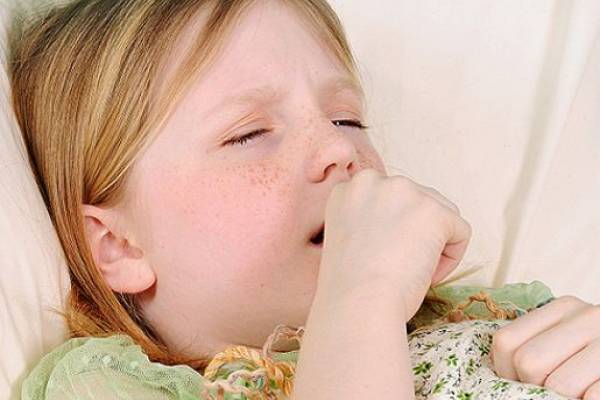
Important . If your baby is sick, you should absolutely not self-medicate. Competent advice and therapy are developed by a pediatrician. Only with its help can you help the baby.
In addition to medications, parents can help remove phlegm from babies under one year of age on their own.
Massage
Massaging the little ones is not difficult; one session takes 8-10 minutes. But you can massage the baby only if there is no temperature .
Before the session, the baby should be given an expectorant prescribed by the doctor . During the massage, gently communicate with the child, smile at him, say nursery rhymes.
Create conditions so that the massage brings only positive emotions .
- Place the baby on his tummy and rub the back area until slightly reddened. Start from the lower back area, moving towards the neck.
- Then lightly pinch the baby's back.
- The next massage movement is tapping with the edge of your palm over the entire back area. Do not overdo it; tapping should be gentle and not cause discomfort. If the child starts coughing, do not worry, this is evidence of mucus release. Let him clear his throat completely and continue the massage.
- Turn the baby onto his back and massage his tummy and chest with soft stroking movements (starting from the area just above the heart towards the collarbones).
- At the end of the massage, ask your baby to cough well again.
Attention . A properly performed massage will help not only remove phlegm from young children, but also improve blood supply to organs and normalize metabolic processes. The massager also has a calming effect, relieves nervous tension and makes you feel good.
Inhalations
To effectively remove phlegm in children, pediatricians recommend using medications that enter the child’s body through inhalation.
Inhalation helps to quickly reanimate the bronchi, restore good breathing and stop coughing.
A big plus is that such treatment has no side effects, since the drugs act directly on the affected organs , bypassing the gastrointestinal tract. When carrying out inhalation, listen to some tips:
- such procedures are allowed for children who are already 2 years old;
- after the water boils, start inhalation 10-15 minutes later (so that the solution does not burn the respiratory tract);
- time of one procedure is 3-5 minutes;
- After inhalation, put the baby to bed, he should not become hypothermic!
For inhalation, you can use honey (in the proportion of 5 parts water, part honey), alkaline mineral water, saline solution.
How to clear the bronchi of mucus using folk remedies? Medicinal plants have good expectorant properties: birch, mint and eucalyptus leaves, sage and chamomile flowers .
Advice . If a child feels a sore throat when coughing, inhalations using onion or garlic juice mixed with water will help (plant juice is diluted with water in a ratio of 1x10).
When a doctor's help is needed
You should consult a doctor in the following cases:
- A sudden cough that occurs after eating or while playing. Small particles of food or parts of toys can get into the trachea. In these situations, the help of a doctor is simply mandatory.
- Severe wheezing when trying to cough up mucus.
- Bloody or green sputum produced when a child coughs.
- High temperature and persistent cough reflex. In this case, expectorants and antipyretics are powerless.
- Poor breathing and severe shortness of breath.
We recommend: Molars in children
Treatment
The doctor will be able to draw up the correct treatment regimen only after examining the child . The doctor will definitely listen to the respiratory tract, look at the condition of the oropharynx, and assess the general condition of the baby. Sometimes excessive mucus is produced in response to teething. This condition cannot be treated according to a regimen such as an allergy or bacterial infection.
Medicines that are approved for children under one year of age are available in the form of syrups or drops, since babies do not know how to swallow tablets. An important part of the treatment is inhalation, massage and exercise therapy for the respiratory system.
Traditional methods
The use of traditional methods of treatment is justified only in the initial stages of the disease and is an additional remedy to the main drug therapy. The most effective folk methods are as follows:
- Gargling with herbal infusions such as chamomile and sage. It is better to carry out the procedure several times a day, half an hour before meals. This method of removing sputum is suitable for children over 3 years old. The effectiveness of medicinal herbs is manifested in the fact that inflammation in the throat goes away, phlegm begins to come out of the respiratory tract intensively and the infection stops spreading in the body.
- Propolis tincture. Before going to bed, the baby needs to drink warm water or milk with propolis tincture. This procedure will help reduce pain and stop a sore throat.
- Consuming lemon and honey throughout the day. A mixture of lemon and honey can be added to herbal teas or warm compotes. It cures dry cough well.
- Honey with radish or onion. Honey water in combination with squeezed radish or onion juice is suitable for liquefying stagnant mucus.
Is it possible to swallow sputum when coughing?
My husband is sick - he coughs a lot.
I’m collecting recipes, but for some reason Chinese medicine isn’t helping. And the Russian funds have already run out, I would give him a loading dose :)
Recipes taken from here:
https://herbcure.ru/03_2.htm https://www.magnita.ru/news/2007-03-04-175
1. Add a teaspoon of unsalted internal pork fat and half a teaspoon of soda to a glass of boiled milk. Stir and drink hot in small sips. You can drink up to 3 glasses a day. Prepare each portion immediately before use. 2. Keep aloe leaves (100 g) in the refrigerator for 10 days. Then chop them and put them in 700 g of hot melted honey. Boil 30 g of linden blossom and 70 g of birch buds in water for a couple of minutes. As it cools, pour the strained and squeezed broth into the chilled honey. Stir the mixture thoroughly and add 0.5 cups of vegetable oil. Store in a cool place, shake before use. Take 1 tablespoon 3 times a day.
3. Dissolve half a teaspoon of baking soda in a glass of hot milk. Drink the solution warm several times an hour, a tablespoon at a time. You can also drink warm milk in half with Borjomi.
4. Take 1 teaspoon of lemon-glycerin syrup as needed: boil 1 lemon in water for 10 minutes, then cut in half and squeeze, add 2 tablespoons of glycerin and honey.
5. Eggnog helps with a dry cough (beat egg yolks with sugar and add a little rum).
6. Drop 3 drops of iodine into a glass of hot water and drink.
7. Recipes for coughs for bronchitis and whooping cough: 500 g of chopped onion, 400 g of sugar, 50 g of honey, 1 liter of water, mix, cook for 3 hours over low heat, cool, strain and pour into a bottle. Drink a tablespoon 4-6 times a day (store sealed in a cool, dark place).
8. Brazilian recipe for fighting cough: pass peeled bananas through a sieve, put in a pan with hot boiled water (2 bananas per 1 glass of water with sugar), heat the mixture and drink.
9. Before going to bed, place 2-3 drops of fir oil on the tip of your tongue.
10. If you have a cough due to a cold, you should immediately smoke nettle. To do this, take last year’s dry stem, cut it to the size of the cigar, pierce the partition with a thin knitting needle and light it from one end, and begin to inhale smoke from the other. If your nasopharynx hurts, you need to blow smoke into your nose, if it hurts in your sternum, then swallow it. Do not smoke for long, otherwise you will feel dizzy. Nettles can be harvested for future use. (source: “Vestnik ZOZH”)
11. Radish juice with honey is a great remedy for long-term coughs. You need to prepare it like this: take a large radish, wash it thoroughly, cut off the top, making a depression in this place. Place honey in the hole. Place the radish on a saucer so that the leaking juice does not spill. In a day, the saucer will be full of healing drink. Take a tablespoon before meals three times a day.
12. Drinking this helps when you have a cough. Boil a medium-sized onion in 0.5 liters of milk and add a spoonful of honey. This mixture should be consumed at night. The milk is very tasty, does not smell of onions at all, and even children drink it easily. A dry cough after it becomes softer and goes away faster.
13. At the Bolshoi Theater, sore throats and colds are dealt with as follows: squeeze lemon juice into a glass of hot tea and add cognac and honey in equal quantities, preferably a tablespoon at a time. If desired, ladies replace cognac with red wine, slightly changing the proportions: half a glass of tea - half a glass of warm wine. Take this “potion” at night, and in the morning you will forget about your cough.
14. Pour 1 STACK of sugar into an enamel saucepan and place on low heat. When the sugar turns brown, pour in a shot of vodka - steam will come out, so immediately close the pan with a lid and turn off the gas. After a while, stir until the sugar is completely dissolved. Take 1 teaspoon 3 times a day.
15. When coughing, it is recommended to chop a peeled onion and add a spoonful of sugar. Squeeze the juice and take a teaspoon 3 times a day 20 minutes before meals. In these cases, also drink fresh onion juice with honey (1:2). This mixture is drunk 1 teaspoon 3-4 times a day 30-40 minutes before meals.
16. Grate the apple and onion. Add honey (all in equal proportions). Take the resulting drug one teaspoon several times during the day.
17. Persistent dry cough: finely chop the orange with the peel, add sugar, cook for 30 minutes. Take 1-2 tbsp. l. syrup for a coughing attack.
18. Garlic syrup is an excellent remedy when it comes to children, who are usually reluctant to take garlic preparations. It is especially indicated for coughs, laryngitis, and diseases of the nasopharynx. Here is one recipe for making good garlic syrup, recommended by the famous Dr. Heinerman: put half a glass of peeled and finely chopped garlic in an enamel pan and pour in fresh dark honey or good quality molasses. Place on the fire and, stirring gently, heat over low heat until all the garlic has dissolved in the syrup. Then cover the saucepan with a lid and reheat, making sure that the syrup does not burn. Remove from heat before it cools, filter and store in the refrigerator. Dose: for small children - 1 teaspoon, for adults - 1 tablespoon. Take every hour.
19. When coughing, peel 2 medium-sized onions, chop finely, add 1/4 cup granulated sugar, 3-4 cups of water and cook until thick syrup. Drink 1 tablespoon every 3 hours.
20. For paroxysmal, painful cough with copious sputum production: a) beat 2 egg yolks with 2 tablespoons of granulated sugar and a spoonful of rum. Drink the mixture on an empty stomach; b) mix 2 teaspoons of honey with 2 tablespoons of butter, 2 raw egg yolks, and a teaspoon of flour. Take 3-5 times a day.
21. For an allergic cough: dissolve a teaspoon of soda in a glass of water and bring to a boil. Breathe over the solution carefully so as not to get burned.
22. To treat cough, improve sputum discharge in case of bronchitis, laryngitis, tracheitis, pneumonia, traditional medicine recommends using freshly squeezed carrot juice with milk (1:1) 1 tablespoon 5-6 times a day or half with honey 1 teaspoon 5 -6 times a day. These mixtures are especially often used in pediatric practice.
23. Fig decoction - pour 100 grams of dried fruits with two glasses of hot water (or milk), simmer over low heat for 15-20 minutes. Leave for 2-3 hours. Take half a glass 2-3 times a day before meals for dry cough. For bronchitis and tracheitis, it is better to use a decoction of milk.
24. Mix cranberry juice with honey. For one glass of juice, one tablespoon of honey. Drink 30 minutes before meals. It helps very well with cold coughs and is an antipyretic.
25. Pass the lemon with the peel through a meat grinder and mix with honey (to taste). Perfectly helps with bronchitis, bronchial asthma, pleurisy and even tuberculosis.
26. Soft collection. Take 5 g of oregano and coltsfoot herbs, 20 g of marshmallow root, pour boiling water (1 glass), leave, strain. Drink 1/2 cup warm 3-4 times a day for coughs and other respiratory diseases.
27. An infusion of viburnum berries is an excellent medicine for colds, coughs, and sore throats.
29. Boil one lemon in water over low heat for 10 minutes, cut it and squeeze the juice into a glass (apple cider vinegar, about 100 g, can be used instead of lemon). Add 2 tablespoons of glycerin to the lemon juice, stir and fill the glass to the brim with honey. For severe and frequent coughs, take 2 teaspoons of the mixture 3 times a day before meals, and also at night. If the cough is severe, but rare and dry, take a teaspoon before and after breakfast, lunch and dinner, and always before bed.
30. Soothes coughs and thins phlegm with an infusion of licorice root (2 parts) and linden blossom (3 parts). Pour one tablespoon of the mixture with a glass of boiling water, leave for 10-15 minutes, strain, take the infusion warm, 0.5 cups at a time.
31. Pour 1 tablespoon of pine buds with a glass of boiling water, cover, leave for 40 minutes, strain. Drink 2-3 sips during coughing attacks.
32. Boil 50 g of red pepper roots with 250 mg of white grape wine. Let it cool, strain, drink it all in 3 doses during the day, hot. Then grate a large onion and mix it with 150 g of goose lard. Take 1 tablespoon in the morning. In the evening before going to bed, rub this mixture on your chest and neck.
33. For a persistent cough, folk healers recommend dissolving 2 tablespoons of sugar in 1 glass of hot milk, adding 1 yolk, mixing everything quickly so that the yolk does not curdle. Drink this mixture in small sips at a time. Go to bed, cover yourself well and sweat.
34. Chop 500 g of peeled onions, add 400 g of sugar and cook over low heat in 1 liter of water for 3 hours. Then let it cool, add 50 g of honey, pour into a bottle and seal. Take 4-6 tablespoons 3 times a day after meals.
35. Take a large onion, peel, wash and grate. Mix with goose fat. Rub this mixture into the chest and neck area and tie a warm scarf around your neck. In the morning on an empty stomach, take 1 tbsp. spoon of this mixture when coughing.
36. When coughing, warming compresses on the chest made from steamed wheat grains, pearl barley or thick wheat porridge are useful. Place the cooked grains or porridge (the water should evaporate) on a linen towel, roll it into a rectangle, wrap it in another towel so that it is not too hot and place the bag on your chest for 2-3 hours, or even overnight. As the porridge cools, the top towel can be removed.
37. Cut 6-8 radishes into very thin slices and sprinkle each slice with sugar. In about half a day the juice will appear. Drink it every hour, 1 tbsp. spoon. Healers claim that this remedy cures the most severe cough in a relatively short period of time.
38. Cut the radish into small cubes, place in a saucepan and sprinkle with sugar. Bake in the oven for two hours. Strain, discard the radish pieces, and pour the liquid into a bottle. Take two teaspoons 3-4 times a day before meals and at night before bed. This remedy is good for treating children, especially if it is given not as a medicine, but as a treat.
39. Grate black radish and squeeze the juice out of it through cheesecloth. Mix 1 liter of this juice with 400 g of liquid honey. Take two tablespoons before meals and before bed. 40. 500 g of peeled and finely chopped onion, 50 g of honey, 400 g of sugar are boiled in 1 liter of water for three hours over low heat. The liquid is cooled, poured into a bottle and sealed tightly. Use a tablespoon 4-5 times a day for severe cough. 41. Place a saucepan with 2 liters of water on the fire. When the water boils, add 200 g of any bran into it and sweeten it with sugar. Drink the decoction throughout the day instead of tea, juice, soup and any other liquid, and certainly hot. This was considered the most effective remedy for loss of voice and therefore was especially revered by Russian theater artists and singers. 42. . Take rye, oats, barley, add chicory and 2 grains (in old Russian pharmacy practice, 1 grain = 0.062 g) of peeled and crushed bitter almonds. Brew and drink like regular coffee, to which you can add hot baked milk. 43. Boiled turnip juice with sugar or honey is also very useful in treating chest pain from colds and coughs. Drink a tablespoon 4-5 times a day hot.
44. . Cut 10 onions and 1 medium-sized head of garlic into small pieces. Boil all this in unpasteurized milk until the onions and garlic become soft. Add a little boudra juice. This tree is otherwise called ivy, or dogmint, and is very common in Russia. Add honey. Take a tablespoon with tea throughout the day - 4-6 times at least. 45. Gogol-mogol - egg yolks beaten with sugar and rum, or with cognac. Two yolks, the rest to taste. Take in the morning on an empty stomach. 46. Mix 2 tablespoons of fresh butter, 2 fresh egg yolks, 1 teaspoon of wheat flour, 2 teaspoons of honey. Take a teaspoon many times throughout the day. 47. Mix radish or carrot juice with milk or honey drink: half juice and half milk or drink. Take a tablespoon 6 times a day. 48. In the spring, drinking birch sap or maple tree sap with milk is very useful for coughs. 49. 8. Rubbing the following mixture into the chest is useful for dry coughs: 2 parts wood oil, 1 part ammonia. 50. To facilitate the separation of sputum, it is very good to take lingonberry juice syrup with sugar or honey syrup orally. This, of course, is also a problem, but I’ll tell you a secret: in stalls where ice cream is sold, you can often find not only frozen cherries, strawberries, plums, but also lingonberries. This syrup should be taken quite often, one tablespoon per dose. During treatment with this remedy, instead of water or tea, drink a decoction of wild strawberries, wild strawberries, or, in extreme cases, from their leaves.
51. To this day, this is the best remedy for mitigating a cough - soda perfectly thins phlegm. Doctors recommend diluting one teaspoon of baking soda in boiling milk and taking it at night.
52. If someone is bothered by a cough, then take a cabbage leaf, dip it in boiling water for 1-2 minutes, then spread it with honey and put it on the chest (for a strong cough - 2 cabbage leaves, one on the chest, the other on the back ). A fitted T-shirt holds the sheet well all night. And the next morning there is almost nothing left of it. Together with honey, it is absorbed into the skin, providing a healing effect. 3-5 nights - and the cold cough is gone.
53. Dill seeds help with coughs and sore throats - they should be sucked thoroughly and then, once softened, chewed several times a day. If your cough is old and dry, then enjoy baked Antonov apples. Do not neglect black apple seeds - they are extremely healing. For chronic cough, the following powder helps a lot: one tablespoon of crushed licorice root, one teaspoon of dill seeds crushed in a coffee grinder and one tablespoon of granulated sugar. Take twice a day: adults - half a teaspoon of powder, children - a third of this portion, on the tip of a spoon.
54. One of the foreign sites recommended drinking a glass of hot beer as a Russian folk remedy for coughing.
55. In case of deep persistent cough, at night, smear the upper part of the body with liquid honey, gently rubbing it into the skin. Top with a linen towel, then compress paper, and a woolen scarf. It is good to drink diaphoretic tea made from raspberry blossom or dried raspberries at night.
56. Pour good vodka (100 - 150 ml) into a metal container (for example, a mug) and set it on fire. At the same time, hold a piece of sugar on a fork over the fire. It will melt and drip into the burning vodka. Carry out the procedure until the fire goes out. The result should be a sweet, thick, cognac-colored syrup, similar in strength to Cahors (most of the alcohol will simply burn off). Pour into a glass container and store at room temperature in a dark place. During coughing attacks, take 1-2 sips until the cough stops completely.
57. Boil a mixture of apple, onion and half a glass of honey over low heat. Take 2 tablespoons twice a day 15 minutes before meals.
58. To 1 kg of fresh honey, add a mixture of 1 kg of raspberries and three-year-old aloe, passed through a meat grinder. The medicine is ready after three days of storage in a cool place. For coughs and bronchial asthma, take a tablespoon three times a day, half an hour before meals. (Healthy Lifestyle Bulletin) 10 rustic cough remedies For a prolonged chest cough, wipe the chest with a dry cloth, then rub internal lard or ghee until dry. It’s good if you add a small amount of pine oil to lard. Grind the grains of rye, oats and barley, add chicory. You can brew the mixture and drink it like regular coffee with hot baked milk. Boiled turnip juice with sugar or honey (preferably with honey) is also very useful in treating chest pain from colds and coughs. Cut into small pieces and boil 10 onions and one head of garlic in unpasteurized milk until the onions and garlic are soft. Add honey. Drink one tablespoon every hour throughout the day. Eggnog (egg yolks beaten with sugar and rum) is also good for coughs if eaten in the morning before meals. Mix radish or carrot juice with milk or honey drink (1:1). Drink one tablespoon six times a day. Mix two tablespoons of fresh unpasteurized butter, two yolks of fresh eggs, one teaspoon of wheat flour and two teaspoons of pure honey. Take one teaspoon orally several times a day. For a dry cough, it is useful to rub the following mixture into the chest: two parts village oil, one part ammonia. To facilitate the separation of sputum, it is useful to take lingonberry juice syrup with sugar or honey syrup orally. Boil 50 grams of pepper roots with a glass of white grape wine. Strain the mixture and drink it all hot three times during the day. In addition to the indicated remedy, you need to take a large onion, grate it, and mix it with goose lard. Rub this mixture into your chest and front of your neck in the evening before going to bed. The patient should also eat one tablespoon of a mixture of onions and goose lard every morning.
Radish and carrot juice with honey for cough
Combine 100 ml of radish, carrot juice and 1 tbsp in a glass. spoon of honey and stir until the honey dissolves.
Take 1 tbsp.
spoon every hour when coughing. Eggnog for cough
Grind 2 egg yolks with granulated sugar until white (the mixture should increase in volume by 2-3 times).
Take on an empty stomach in 2 divided doses for coughing. Radish juice with honey is a folk remedy for the prevention and treatment of many diseases.
Prepare fresh radish juice, mix it in equal quantities with honey (if you don’t have it, you can use sugar) and take first 1/4 cup, and then 1/3 cup 4— 6 times a day for acute respiratory diseases, bronchitis, whooping cough (depending on the age of the child, the dose is reduced by 2-3 times) and tuberculosis as an expectorant, anti-inflammatory and cough sedative.
This mixture also has a positive effect on dropsy, anemia, kidney and bladder stones, gout, liver diseases, flatulence and malignant tumors.
It is also used as a milk extractor and anthelmintic. Honey with olive oil against cough in children
Mix bee honey and warm olive oil in equal proportions.
Give young children 1 teaspoon 3-4 times a day when coughing. The drug is also effective in the treatment of whooping cough. Folk remedy for cough in children
Cut the washed and peeled black radish into thin slices and sprinkle with sugar.
After 6-8 hours, you can drink the released juice, 1 tbsp. spoon every hour. For coughs in children. Honey with plantain juice against cough and stomach diseases
Mix 500 g of bee honey with 500 ml of plantain juice and cook over low heat for 20 minutes. After cooling, the mixture is ready for use.
Take it 1 tbsp. spoon 20-30 minutes before meals 3 times a day for stomach diseases.
The warm mixture in the same doses is taken as an expectorant and emollient for acute and chronic bronchitis, as well as whooping cough.
Radish with honey against cough
Take a large radish, wash it well, remove the top part with a knife and cut a hole large enough to fit two tablespoons of liquid honey. Place the radish in an upright position in a bowl, cover with thick paper and leave for 3-4 hours.
Give the resulting mixture of black radish juice and honey to adults, 1 tbsp.
spoon, and for children 1 teaspoon 3-4 times a day 20-30 minutes before meals when coughing (it is preferable to take the last dose before bedtime). Honey with radish is a folk remedy for cough.
Grate the peeled radish, squeeze out the juice and mix it with tbsp.
spoon of honey. Take 2 tbsp. spoons of the mixture 20 minutes before meals 3-4 times a day when coughing. Infusion of anise with honey and cough
Take 2 tbsp.
spoons of anise seeds, pour 0.5 liters of boiling water, close the lid and place in a boiling water bath for 15 minutes. Then remove, let stand for 20-30 minutes, strain, dilute honey in the infusion (for 1 glass - 1 tablespoon of honey) and take 1/4 glass 3-4 times a day when coughing. Viburnum with honey and cough
Take 100 g of viburnum berries, rinse, add 200 g of honey, cook over low heat for 5 minutes, cool at room temperature and take 2 tbsp.
spoons of the mixture 4-5 times a day as an expectorant, anti-inflammatory and cough sedative for tracheitis, bronchitis, etc., washed down with warm water. Balm for bronchitis
Take 500 g of crushed walnuts, 300 g of honey, 100 g of aloe juice and add the juice of 4 lemons.
Mix everything well and take 1 teaspoon for children, and 1 tbsp for adults. spoon 3 times a day half an hour before meals for cough, bronchitis, etc. Onions with honey and bronchitis
Take 500 g of peeled onions, chop, crush 50 g of honey, 400 g of sugar and cook over low heat in 1 liter of water for 3 hours, then let cool, pour into dark glass bottles, seal and put in fridge.
Take the mixture warm, 1 tbsp. spoon 4-6 times a day for severe cough, acute and chronic bronchitis. Infusion of coltsfoot and respiratory diseases
2-3 tbsp. spoons of dry crushed flowers and leaves of coltsfoot, pour 0.5 liters of boiling water into a thermos, leave for 1-2 hours, strain and drink 1/3 cup 3 times a day half an hour before meals for laryngitis, acute and chronic bronchitis , bronchiectasis, abscesses and pneumonia, bronchial asthma and other respiratory diseases.
The infusion of coltsfoot has anti-inflammatory, antimicrobial, mild diaphoretic and antispasmodic effects.
It enhances the secretion of the bronchial glands, promotes expectoration of mucus, tones and strengthens. Infusion of oregano and respiratory diseases
3 tbsp. spoons of dry crushed herbs, pour 0.5 liters of boiling water into a thermos, leave for 1.5-2 hours, strain and drink 1/2 cup 3-4 times a day 20-30 minutes before meals for tracheitis, bronchitis and lung diseases .
Oregano infusion has antimicrobial, anti-inflammatory and analgesic properties.
Decoction of licorice root and respiratory diseases
2 tbsp. spoons of dry crushed licorice root (licorice) pour 0.5 liters of boiled water, bring to a boil and cook over low heat for 10 minutes, leave for 1-2 hours, strain and drink 1/4-1/3 cup 4-5 times per day for tracheitis, bronchitis and bronchial asthma.
A decoction of licorice root has antimicrobial, anti-inflammatory, enveloping, expectorant, antispasmodic and antiallergic effects.
A decoction of young shoots of spruce in milk and respiratory diseases
Prepare a decoction of young tops of spruce branches with buds (or immature cones) in milk: boil 30 g of young chopped shoots (or young cones) for 10 minutes in 1 liter of milk, leave for 2-3 hours , strain and drink 1 glass 3-4 times a day for colds, respiratory diseases and pulmonary tuberculosis.
The recommended decoction has anti-inflammatory, disinfectant and analgesic effects.
Marshmallow infusion, honey and respiratory diseases
COLD INSTRUCTION
Take 1 tbsp. spoon of dry crushed marshmallow root (particles no more than 3 mm), pour a glass of cold boiled water, strain after an hour, squeeze out the remaining raw materials, add honey to taste to the resulting mucous infusion and drink 1-2 tbsp. spoons (1 teaspoon for children) every 2 hours for chronic bronchitis, tracheitis, laryngitis, pneumonia and bronchial asthma (especially in children), as well as for influenza and sore throat.
HOT INSTRUCTION
2 tbsp. spoons of crushed marshmallow root pour a glass of boiled water, keep in a boiling water bath for 15 minutes, leave for half an hour, strain, dilute honey to taste and drink in the same doses and according to the same indications as the cold infusion.
When marshmallow is infused in cold water, only mucus is extracted, and when infused in hot water, mucus and starch are extracted.
Store the infusion in the refrigerator for no more than two days.
Plantain infusion and respiratory diseases
2-3 tbsp. spoons of dry crushed leaves of plantain, pour 0.5 liters of boiling water into a thermos, leave for 1-2 hours, strain and drink 1/3 cup 3-4 times a day for tracheitis, bronchitis, pneumonia, etc.
Plantain infusion has an anti-inflammatory and expectorant effect.
Decoction of primrose roots and respiratory diseases
2 tbsp. spoons of dry crushed primrose roots pour 0.5 liters of boiling water, cook over low heat for 15 minutes, leave for 3-4 hours, strain and drink 1/4 - 1/3 cup 3-4 times a day for acute respiratory diseases, chronic tracheitis, bronchitis and pneumonia.
A decoction of primrose roots has an expectorant, as well as mild diaphoretic and diuretic effects.
Marshmallow, flax, mallow and diseases of the respiratory system, digestion and excretion
Prepare the following mixture:
Marshmallow, flowers and leaves 40.0 Flax, seeds 30.0 Mallow, flowers 30.0
2 tbsp. spoons of dry crushed collection, pour 0.5 liters of boiling water into a thermos, leave for 1-2 hours, strain and drink 1/3 - 1/2 cup of infusion 3-4 times a day for diseases of the respiratory system, digestive tract and urinary tract.
The infusion is a good anti-inflammatory, enveloping and pain-soothing agent.
It also has expectorant properties and soothes painful coughs. Collection of herbs and respiratory diseases
Prepare the following mixture:
Agrimony, grass 40.0 Ivy budra, leaves 30.0 European hoof, grass 30.0
2 tbsp.
spoons of the collection pour 0.5 liters of boiling water into a thermos, leave for 1-2 hours, strain and drink 1/2 cup 4-5 times a day for tracheitis, bronchitis and pneumonia as an anti-inflammatory and expectorant. Aloe juice with honey and bronchitis
Cut the lower leaves of the agave, wash, chop, squeeze out the juice using a manual juicer and add honey (for 5 ml of juice - 1 g of honey). Take 1 teaspoon of the fresh mixture 3 times a day before meals for tracheitis and bronchitis.
Aloe juice with honey also helps well with inflammatory diseases of the oral cavity, pharynx and larynx.
Infusion of coltsfoot with honey and respiratory diseases
Take 1 tbsp.
a spoonful of dry crushed coltsfoot leaves, pour a glass of boiling water in a small enamel saucepan, close the lid and leave for 15 minutes in a boiling water bath. Then leave the infusion to cool at room temperature for half an hour to an hour, then strain and drink 1/3 cup 2-3 times a day as an emollient, expectorant, anti-inflammatory, antimicrobial and diaphoretic for diseases of the respiratory tract (laryngitis, tracheitis, acute and chronic bronchitis, bronchiectasis, pneumonia) and influenza. Radish juice with honey and bronchitis
Mix 2 cups of radish juice with 1 cup of honey and take 1-2 tbsp.
spoons (for children - a teaspoon) every hour for hoarseness, cough, diseases of the bronchi and lungs. Fragrant violet tea with honey and bronchitis
Take 2 tbsp.
spoons of dry crushed leaves of fragrant violet, pour a glass of boiling water in a porcelain teapot, leave for 12-15 minutes and drink warm with honey (dissolve it to taste) half a glass 3 times a day for cough, bronchitis, bronchial asthma and tuberculosis (for severe cough take 50 ml every 3 hours). Pork “health” and chronic bronchitis
Pork “health” (i.e., internal lard from the intestines, which looks like a mesh) is placed in a bowl and placed in a warm, but not hot oven or on very low heat, so that the lard drips from the mesh. When it is all melted, it is poured into a jar and placed in a cold place.
For chronic bronchitis, you should take 1 dessert spoon of melted lard, dissolve it in a glass of hot milk and drink in sips.
In addition, it is recommended to rub melted lard mixed with turpentine into the skin of the chest until dry. Infusion of herbs with honey and bronchitis
Prepare a collection of herbs with the following composition:
Lungwort, herb 40.0 Coltsfoot, leaves, flowers 25.0 Chamomile, flowers 20.0 Oregano, herb 15.0
Take 2 tbsp.
tablespoons of the dry crushed mixture, pour 300 ml of boiling water, leave with the lid closed in a boiling water bath for 15 minutes, leave for half an hour to an hour, strain, dilute honey to taste and drink 150 ml 4-5 times a day for acute and chronic bronchitis. Clover flower tea with honey and bronchitis
Take 2 tbsp.
spoons of dry crushed clover flowers, pour a glass of boiling water in a porcelain teapot, leave for 12-15 minutes and drink warm with honey, half a glass 3-4 times a day for bronchitis, tracheitis and bronchial asthma. Tea from marshmallow flowers with honey and bronchitis
Take 2 tbsp.
spoons of marshmallow flowers, pour a glass of boiling water in a porcelain teapot, let it brew for 10-15 minutes and drink warm 1/2 cup with honey 2-3 times a day for coughs, acute and chronic bronchitis and other acute respiratory diseases, as well as for inflammatory diseases of the gastrointestinal tract and urinary tract. Breast tea with honey and bronchitis
Take 40 g of dry crushed marshmallow root and coltsfoot leaves, 20 g of oregano herb and mix well.
2 tbsp.
pour spoons of the mixture into a porcelain teapot with a glass of boiling water, leave for 12-15 minutes and drink warm 1/2 cup with honey 3-4 times a day for diseases of the bronchi and lungs. Balm for bronchitis
Take 1 tbsp.
a spoonful of fresh aloe juice, 100 g of butter (unsalted), 100 g of pork (or goose) lard, 100 g of natural bee honey and 50 g of cocoa. Mix everything thoroughly. Take 1 tbsp. spoon per glass of hot milk (children 1 teaspoon or 1 dessert spoon, depending on age) 2 times a day. Elecampane decoction with honey and respiratory diseases
Take 2 tbsp.
spoons of dry crushed elecampane roots, pour 0.5 liters of boiled water, cook over low heat for 20-30 minutes, leave for 1-2 hours, strain, bring the decoction with boiled water to a volume of 0.5 liters, dissolve honey to taste and drink warm 1/2 cup 3 times a day for cough, bronchitis, pneumonia and flu. A decoction of elecampane with honey is a fairly effective remedy for respiratory diseases. Turnip and bronchitis
Take 2 tbsp.
spoons of chopped turnip root, pour a glass of boiled water, cook for 15 minutes, leave for half an hour to an hour, strain, bring the volume of the decoction with boiled water to 200 ml and drink 1/4 glass 4 times a day for bronchitis. You can also take 1 glass of turnip decoction once a day at night. Aloe, honey and bronchitis
Dilute 300 g of honey with half a glass of boiled water, add finely chopped aloe leaf and cook over low heat for 2 hours.
Then remove from heat, stir and leave to cool. Take 1 tbsp. spoon (children 1 teaspoon or dessert spoon depending on age) 3 times a day for bronchitis. Onions with goose fat and bronchitis
Grate a large onion, mix with goose fat and use to rub into the chest and front of the neck in the evening before bed.
In the morning, eat 1 tablespoon of this mixture. Treatment continues until recovery. Lingonberry juice with honey and bronchitis
Take lingonberry juice mixed in half with honey, 1 tbsp.
spoon 3-4 times a day. Radish with milk and bronchitis
Mix radish juice with milk in equal proportions and take 30-50 ml 4-6 times a day.
Sage with milk and bronchitis
Place 1 tbsp in a small enamel pan.
spoon of chopped sage herb, pour a glass of milk, boil, leave for 30-40 minutes with the lid closed and strain. Then boil again and drink before bedtime for tracheitis, bronchitis, etc. Infusion of cumin and respiratory diseases
2-3 tbsp. spoons of caraway fruits pour 0.5 liters of boiling water into a thermos, leave for 2-3 hours, strain and drink 1/3 - 1/2 cup 2-3 times a day for tracheitis, bronchitis and other inflammatory diseases of the respiratory system -
Cumin reduces spasms of bronchial smooth muscles, has an antiseptic and analgesic effect, and promotes the separation of mucus and sputum.
Cucumber juice and respiratory diseases
Drink 1/4 - 1/2 cup of freshly squeezed cucumber juice 2-3 times a day (if desired, you can sweeten it with honey) for bronchitis, tracheitis and other respiratory diseases.
Cucumber juice can be drunk on any other occasion as a refreshing and healthy drink.




